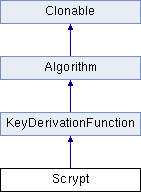Scrypt key derivation function. More...
 Inheritance diagram for Scrypt:
Inheritance diagram for Scrypt:Public Member Functions | |
| std::string | AlgorithmName () const |
| Provides the name of this algorithm. More... | |
| size_t | MaxDerivedKeyLength () const |
| Determine maximum number of bytes. More... | |
| size_t | GetValidDerivedLength (size_t keylength) const |
| Returns a valid key length for the derivation function. More... | |
| size_t | DeriveKey (byte *derived, size_t derivedLen, const byte *secret, size_t secretLen, const NameValuePairs ¶ms) const |
| Derive a key from a seed. More... | |
| size_t | DeriveKey (byte *derived, size_t derivedLen, const byte *secret, size_t secretLen, const byte *salt, size_t saltLen, word64 cost=2, word64 blockSize=8, word64 parallelization=1) const |
| Derive a key from a seed. More... | |
 Public Member Functions inherited from KeyDerivationFunction Public Member Functions inherited from KeyDerivationFunction | |
| virtual size_t | MinDerivedKeyLength () const |
| Determine minimum number of bytes. More... | |
| virtual bool | IsValidDerivedLength (size_t keylength) const |
| Returns whether keylength is a valid key length. More... | |
| virtual void | SetParameters (const NameValuePairs ¶ms) |
| Set or change parameters. More... | |
 Public Member Functions inherited from Algorithm Public Member Functions inherited from Algorithm | |
| Algorithm (bool checkSelfTestStatus=true) | |
| Interface for all crypto algorithms. More... | |
| virtual std::string | AlgorithmProvider () const |
| Retrieve the provider of this algorithm. More... | |
 Public Member Functions inherited from Clonable Public Member Functions inherited from Clonable | |
| virtual Clonable * | Clone () const |
| Copies this object. More... | |
Static Public Member Functions | |
| static std::string | StaticAlgorithmName () |
Detailed Description
Scrypt key derivation function.
The Crypto++ implementation uses OpenMP to accelerate the derivation when available.
The Crypto++ implementation of Scrypt is limited by C++ datatypes. For example, the library is limited to a derived key length of SIZE_MAX, and not (2^32 - 1) * 32.
- See also
- Stronger Key Derivation via Sequential Memory-Hard Functions, The scrypt key derivation function and RFC 7914, The scrypt Password-Based Key Derivation Function
- Since
- Crypto++ 7.0
Member Function Documentation
◆ AlgorithmName()
|
inlinevirtual |
Provides the name of this algorithm.
- Returns
- the standard algorithm name
Implements KeyDerivationFunction.
◆ MaxDerivedKeyLength()
|
inlinevirtual |
Determine maximum number of bytes.
- Returns
- Maximum number of bytes which can be derived
Reimplemented from KeyDerivationFunction.
◆ GetValidDerivedLength()
|
virtual |
Returns a valid key length for the derivation function.
- Parameters
-
keylength the size of the derived key, in bytes
- Returns
- the valid key length, in bytes
Implements KeyDerivationFunction.
Definition at line 178 of file scrypt.cpp.
◆ DeriveKey() [1/2]
|
virtual |
Derive a key from a seed.
- Parameters
-
derived the derived output buffer derivedLen the size of the derived buffer, in bytes secret the seed input buffer secretLen the size of the secret buffer, in bytes params additional initialization parameters to configure this object
- Returns
- the number of iterations performed
- Exceptions
-
InvalidDerivedKeyLength if derivedLenis invalid for the scheme
DeriveKey() provides a standard interface to derive a key from a secret seed and other parameters. Each class that derives from KeyDerivationFunction provides an overload that accepts most parameters used by the derivation function.
the number of iterations performed by DeriveKey() may be 1. For example, a scheme like HKDF does not use the iteration count so it returns 1.
Implements KeyDerivationFunction.
Definition at line 259 of file scrypt.cpp.
◆ DeriveKey() [2/2]
| size_t Scrypt::DeriveKey | ( | byte * | derived, |
| size_t | derivedLen, | ||
| const byte * | secret, | ||
| size_t | secretLen, | ||
| const byte * | salt, | ||
| size_t | saltLen, | ||
| word64 | cost = 2, |
||
| word64 | blockSize = 8, |
||
| word64 | parallelization = 1 |
||
| ) | const |
Derive a key from a seed.
- Parameters
-
derived the derived output buffer derivedLen the size of the derived buffer, in bytes secret the seed input buffer secretLen the size of the secret buffer, in bytes salt the salt input buffer saltLen the size of the salt buffer, in bytes cost the CPU/memory cost factor blockSize the block size parallelization the parallelization factor
- Returns
- the number of iterations performed
- Exceptions
-
InvalidDerivedKeyLength if derivedLenis invalid for the scheme
DeriveKey() provides a standard interface to derive a key from a seed and other parameters. Each class that derives from KeyDerivationFunction provides an overload that accepts most parameters used by the derivation function.
The CPU/Memory cost parameter ("N" in the documents) must be larger than 1, a power of 2, and less than 2^(128 * r / 8).
The parameter blockSize ("r" in the documents) specifies the block size.
The parallelization parameter ("p" in the documents) is a positive integer less than or equal to ((2^32-1) * 32) / (128 * r). Due to Microsoft and its OpenMP 2.0 implementation parallelization is limited to std::numeric_limits<int>::max().
Scrypt always returns 1 because it only performs 1 iteration. Other derivation functions, like PBKDF's, will return more interesting values.
The Crypto++ implementation of Scrypt is limited by C++ datatypes. For example, the library is limited to a derived key length of SIZE_MAX, and not (2^32 - 1) * 32.
Definition at line 282 of file scrypt.cpp.
The documentation for this class was generated from the following files:
